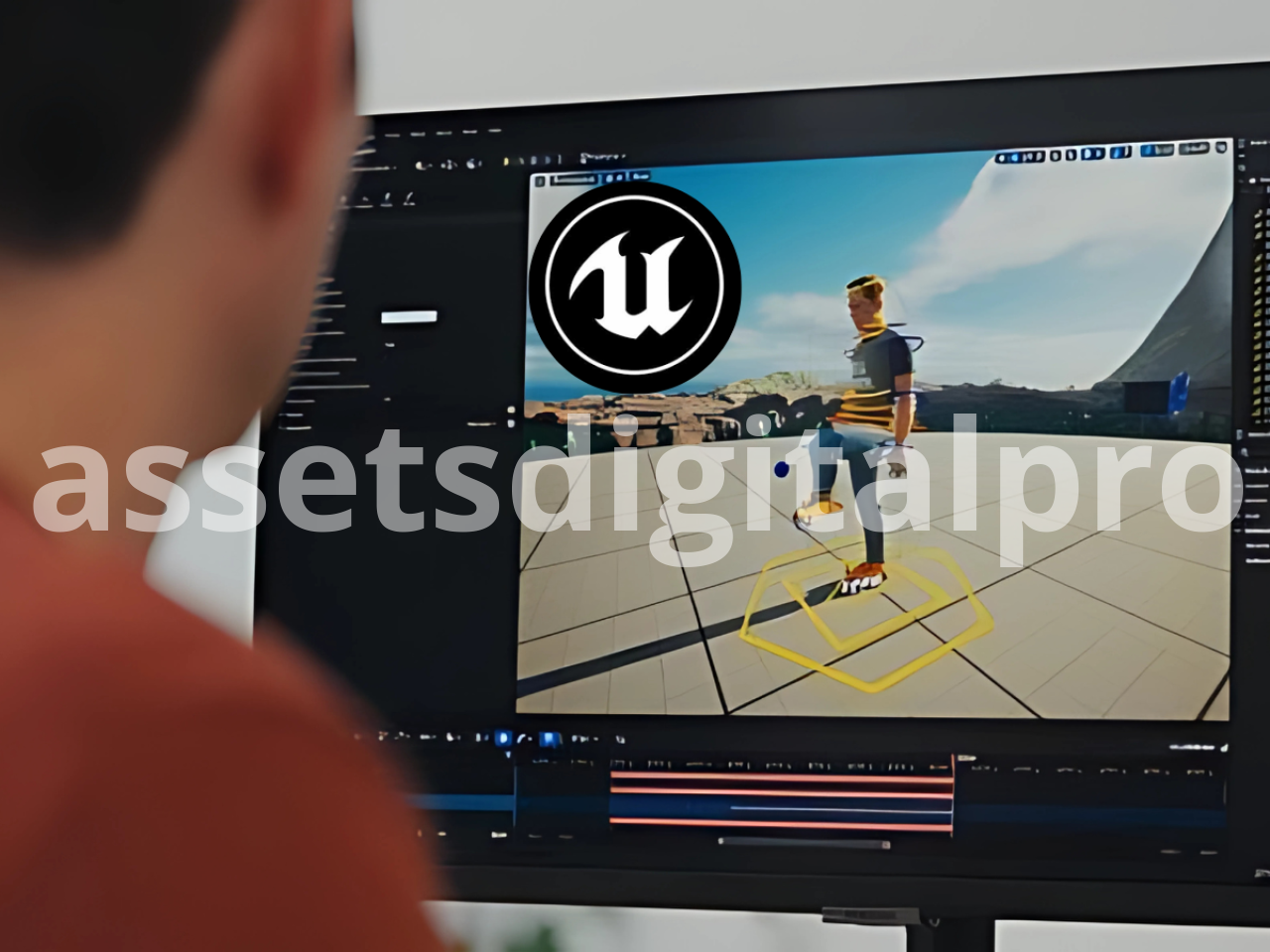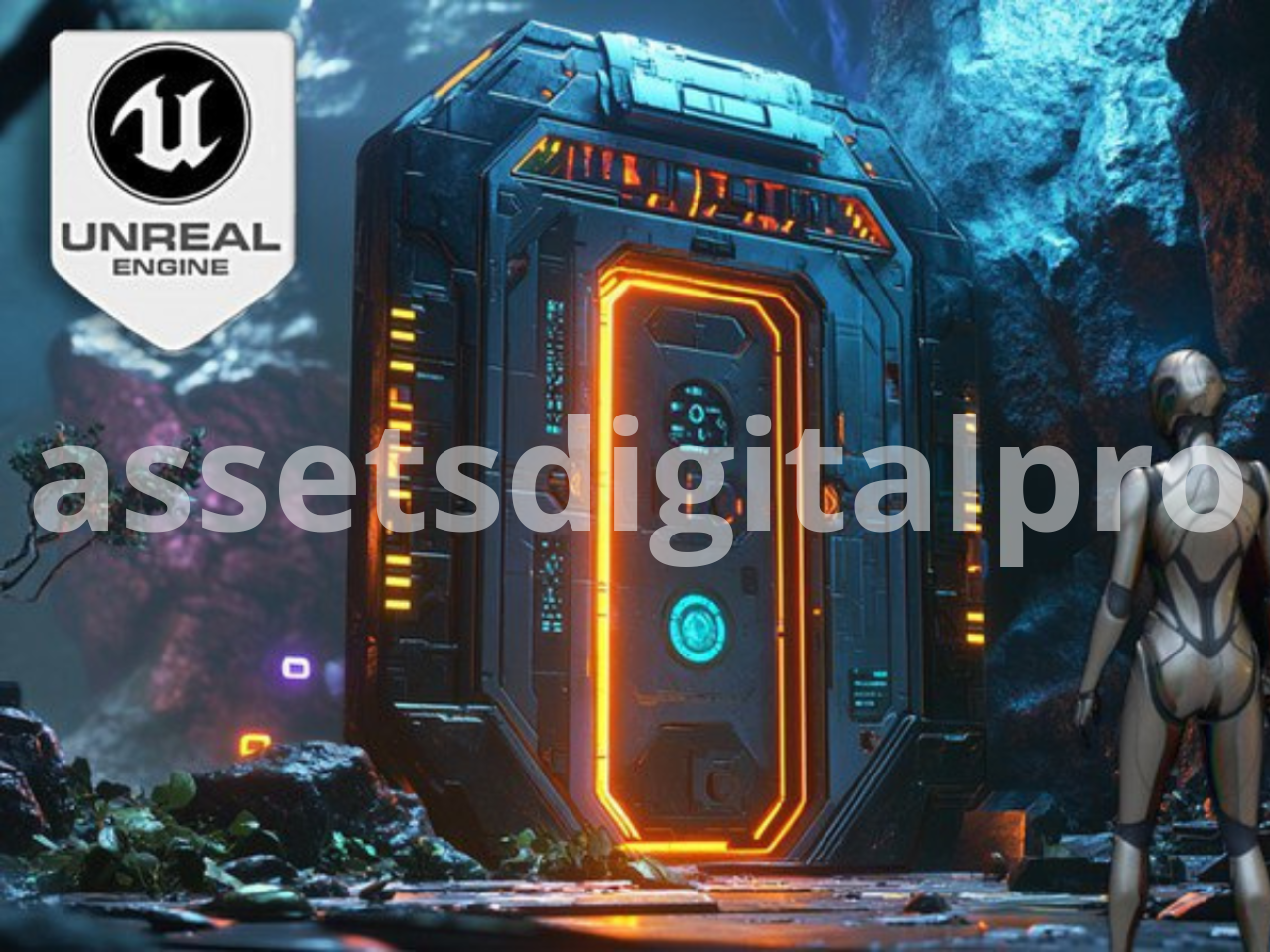Unreal Engine 6: The Ultimate Guide to Release Date Rumors, Features & Predictions [Updated 2025]
![Unreal Engine 6: The Ultimate Guide to Release Date Rumors, Features & Predictions [Updated 2025]](https://assetsdigitalpro.com/uploads/blog/202505/img_6816b4d7a86597-23270328.png)
Executive Summary: What We Know About Unreal Engine 6
Unreal Engine 6 has not been officially announced by Epic Games, but industry trends and technological advancements suggest it's on the horizon. This comprehensive guide aggregates all available information, expert predictions, and informed speculation based on Epic's historical release patterns and technological roadmaps.
Current Status at a Glance:
- Official Announcement: Not yet made by Epic Games
- Estimated Release Window: 2026-2027 (based on historical release cycles)
- Most Anticipated Features: Advanced AI integration, next-generation rendering beyond Nanite/Lumen, and enhanced cross-platform development tools

Is Unreal Engine 6 Confirmed? The Current Official Status
No, Epic Games has not officially announced Unreal Engine 6. While speculation abounds in the developer community, Epic remains focused on enhancing and expanding Unreal Engine 5's capabilities through regular updates and feature additions.
The interest in UE6 stems from natural industry progression, as developers and creators look toward the future of real-time rendering and game development technologies. With competitors like Unity advancing their offerings and hardware manufacturers pushing boundaries with new GPU architectures, the gaming and tech communities naturally anticipate Epic's next major engine iteration.
While Tim Sweeney, CEO of Epic Games, hasn't explicitly mentioned UE6, he has emphasized Epic's commitment to "continuous evolution of real-time rendering technology" in recent tech conferences, hinting at ongoing research and development beyond UE5's current capabilities.
Potential Unreal Engine 6 Release Date Speculation
Historical Release Pattern Analysis
Understanding when UE6 might arrive requires examining Epic's historical release timeline:
| Engine Version | Announcement Date | Public Release | Development Timespan |
|---|---|---|---|
| Unreal Engine 3 | 2004 | 2006 | ~2 years |
| Unreal Engine 4 | 2012 | 2014 | ~2 years |
| Unreal Engine 5 | 2020 | 2022 | ~2 years |
| Unreal Engine 6 | ? | ? | ? |
This pattern suggests approximately 6-8 years between major version releases, with a 2-year development cycle from announcement to public availability.

Factors Influencing Release Timing
Several factors will determine when we might see UE6:
- UE5 Maturity Cycle - Epic is likely to fully leverage UE5's capabilities before shifting resources to a new major version
- Hardware Generation Transitions - The emergence of next-generation consoles (PS6/Next Xbox) would present an ideal launch window
- Competitive Market Dynamics - Advancements from competing engines could accelerate Epic's timeline
- Technological Breakthroughs - Fundamental innovations in rendering, AI, or computational efficiency might necessitate a new engine architecture
Most Likely Release Scenarios
Based on comprehensive analysis of these factors, we project the following timeline possibilities:
- Early Announcement Scenario: Late 2025 announcement with 2027 release
- Standard Cycle Scenario: 2026 announcement with 2028 release
- Extended Development Scenario: 2027 announcement with 2029 release
The most probable outcome appears to be an announcement in 2026, followed by a public release in early 2028, allowing Epic to fully capitalize on UE5's capabilities while preparing for the next console generation.
Expected & Rumored Features
Graphics Enhancements: Beyond Nanite and Lumen
Unreal Engine 5 revolutionized real-time rendering with Nanite virtualized geometry and Lumen global illumination. UE6 is expected to take these foundations to new heights:
- Path Tracing Integration: While currently experimental in UE5, fully optimized path tracing could become a core rendering feature in UE6, enabling photorealistic light simulation with manageable performance costs
- Nanite 2.0: Enhanced micropolygon rendering with support for advanced material types and procedural geometry
- Volumetric Technologies: Improved handling of volumetric effects like fog, clouds, and fluid simulations with more realistic light interaction
- Hardware-Accelerated Rendering: Deeper integration with next-generation GPU architectures, potentially including specialized AI acceleration for rendering tasks
Industry insiders note that Epic researchers have published papers on neural rendering techniques that could significantly reduce computational costs while improving visual fidelity—technology that seems destined for UE6 implementation.
AI Integration: The Game-Changing Element
UE6 is positioned to make AI a cornerstone of game development workflows:
- Generative Asset Creation: Built-in AI tools for generating textures, models, animations, and environmental elements from text prompts or reference images
- Dynamic Behavior Systems: More sophisticated AI frameworks for creating intelligent NPCs and responsive game worlds
- Procedural Content Generation: AI-driven systems for automatically generating game levels, quests, and narrative elements
- Development Assistant Tools: AI-powered debugging, optimization suggestions, and code generation features
Epic's acquisition of AI-focused companies and their recent job listings for "AI systems architects" strongly suggest that UE6 will feature unprecedented AI integration.
Performance & Optimization: Solving UE5's Challenges
While UE5 pushed visual boundaries, developers have identified optimization challenges that UE6 is expected to address:
- Enhanced Multi-threading: More efficient utilization of multi-core CPUs and advanced threading models
- Intelligent Asset Streaming: AI-driven prediction systems for ultra-efficient memory management and asset loading
- Scalable Systems: Better performance scaling across different hardware configurations, from mobile devices to high-end PCs
- Reduced Development Build Times: Significant improvements to iteration speed for developers
Recent presentations by Epic engineers have hinted at research into compilation technologies that could dramatically reduce build times—a pain point frequently mentioned by current UE developers.

Workflow & Developer Experience: Revolutionizing Creation
UE6 is likely to introduce substantial quality-of-life improvements for developers:
- Evolution of Verse: Enhanced programming language capabilities with better performance and more intuitive syntax
- Collaborative Development: Improved real-time collaboration tools for development teams, potentially cloud-based
- Unified Asset Management: More sophisticated asset version control and management systems
- Streamlined UI/UX: Modernized editor interface with customizable workflows and improved accessibility
Epic's increased focus on making Unreal accessible to non-traditional developers suggests UE6 will continue this trend with more intuitive creation tools.
Platform Focus: Next-Generation Hardware Support
UE6 will likely be positioned for the next wave of gaming and computing hardware:
- Next-Gen Console Optimization: Built specifically with PS6 and the next Xbox generation in mind
- Advanced XR Support: Enhanced frameworks for VR/AR/MR development
- Cloud Computing Integration: Native support for distributed rendering and cloud-based game systems
- Mobile Performance: Continued emphasis on making high-quality experiences possible on mobile devices
How Might Unreal Engine 6 Compare to Unreal Engine 5?
| Feature Area | Unreal Engine 5 (Confirmed) | Unreal Engine 6 (Speculated) |
|---|---|---|
| Core Rendering | Nanite & Lumen | Enhanced path tracing, Nanite 2.0 |
| Global Illumination | Lumen | Advanced GI with reduced performance cost |
| Asset Creation | Traditional + some procedural | AI-assisted generation throughout |
| Physics | Chaos Physics System | Advanced fluid/cloth simulation, improved performance |
| Audio | MetaSounds | Enhanced spatial audio, AI-driven sound generation |
| Scripting | Blueprint & C++ | Blueprint, C++, advanced Verse language |
| Minimum Hardware | Moderate requirements | Potentially higher baseline requirements |
| Optimization | Requires significant expertise | More automated optimization tools |
| Collaboration | Basic multi-user editing | Comprehensive cloud collaboration |
Evolutionary or Revolutionary?
The biggest question surrounding UE6 is whether it will represent an evolutionary improvement over UE5 or a revolutionary leap forward. Arguments exist for both possibilities:
Arguments for Evolutionary Change:
- UE5 architecture is still relatively modern and adaptable
- Many core technologies (Nanite, Lumen) have room for refinement
- Development community benefits from stability and incremental improvements
Arguments for Revolutionary Change:
- Next-generation console hardware might enable fundamentally new approaches
- AI advancements could transform core development paradigms
- Competitive pressure might drive more dramatic innovation
- New rendering techniques might require architectural changes
Most industry experts predict UE6 will feature revolutionary elements within an evolutionary framework—maintaining compatibility while introducing transformative new systems.
Potential Impact on Industries
Game Development
Unreal Engine 6 will likely reshape game development across both AAA and indie sectors:
AAA Studios:
- Higher fidelity visuals with lower optimization overhead
- Larger, more dynamic game worlds
- Reduced development time through AI assistance
- More believable character behaviors and world simulation
Indie Developers:
- More accessible tools for creating high-quality visuals
- AI-assisted development reducing resource requirements
- Better performance on mid-range hardware
- Simplified workflows for smaller teams
Film & Television Production
The virtual production revolution started by UE5 will likely accelerate with UE6:
- Enhanced real-time rendering for in-camera visual effects
- Better integration with traditional filmmaking workflows
- More sophisticated virtual camera systems
- AI-driven character animation and crowd simulation
Architecture & Visualization
Architectural visualization stands to benefit from UE6 advancements:
- Even more photorealistic lighting and materials
- Faster iteration on design changes
- Real-time collaboration between architects and clients
- Better VR/AR integration for immersive design reviews
Automotive Industry
The automotive sector's use of real-time visualization will expand:
- More accurate materials and lighting for vehicle visualization
- Enhanced virtual showroom experiences
- Advanced simulation capabilities for autonomous vehicle testing
- Improved configurator systems for customers
Hardware Requirements Speculation
While specific hardware requirements remain speculative, industry trends suggest UE6 will likely require:
Baseline Requirements (Speculated):
- CPU: 8-core processor (AMD Ryzen 7 or Intel i7 equivalent)
- GPU: RTX 4060 / RX 7600 class or higher
- RAM: 16GB minimum, 32GB recommended
- Storage: Fast SSD storage (NVMe recommended)
Recommended for Full Feature Set (Speculated):
- CPU: 12+ core processor
- GPU: RTX 5070 / RX 8700 class or higher
- RAM: 32GB minimum, 64GB for complex projects
- Storage: High-speed NVMe SSD with at least 1TB capacity
These projections are based on current hardware evolution trends and expected feature requirements.
Unreal Engine 6 News & Rumor Tracker
| Date | Development | Source | Significance |
|---|---|---|---|
| April 2025 | Epic posts job listings for "Next-Gen Rendering Architect" | Epic Careers Page | Suggests active development of future rendering technologies |
| March 2025 | Tim Sweeney mentions "post-UE5 research" in GDC interview | GDC Talks | First official acknowledgment of technologies beyond UE5 |
| February 2025 | Epic acquires AI tech startup specialized in content generation | TechCrunch | Indicates strategic direction for future tools |
| January 2025 | Research paper from Epic engineers on neural rendering optimization | SIGGRAPH Proceedings | Reveals technological focus areas |
This section will be regularly updated as new information emerges.
Frequently Asked Questions
Will Unreal Engine 6 be free?
While not officially confirmed, Epic is likely to maintain its current business model of free access with a royalty structure for commercial products. This has proven successful for Epic and accessible for developers.
Will UE6 replace UE5 immediately?
No. Based on previous transitions, UE5 will continue to be supported for several years after UE6's release, with many developers continuing to use it for ongoing projects.
When will Epic announce Unreal Engine 6?
There is no official timeline, but based on historical patterns, an announcement could come as early as 2026, with a full release following 1-2 years later.
Should I learn UE5 now or wait for UE6?
Absolutely learn UE5 now. The core concepts, workflows, and many technologies will transfer to UE6, and expertise in UE5 will provide a strong foundation for eventual migration.
Will my current projects be compatible with UE6?
Epic typically provides migration paths for projects, but the process may require some manual adjustments. The scope of changes will depend on how revolutionary UE6's architecture proves to be.
Will UE6 focus more on games or broader applications?
Epic is likely to continue expanding Unreal's utility across multiple industries while maintaining its core strength in game development. Expect enhanced tools for film, architecture, automotive, and industrial applications.
Conclusion & How to Stay Updated
While Unreal Engine 6 remains on the horizon, the technological foundations are already being laid through Epic's ongoing research and development efforts. The current focus remains on maximizing UE5's capabilities, but the next generation of real-time rendering is undoubtedly taking shape behind closed doors.
The most prudent approach for developers is to master current UE5 technologies while staying informed about emerging trends that may indicate UE6's direction. The skills and knowledge acquired today will remain valuable regardless of how revolutionary the next engine iteration proves to be.
This guide will be regularly updated as new information emerges about Unreal Engine 6. Bookmark this page to stay informed about the latest developments, rumors, and official announcements from Epic Games regarding the future of Unreal Engine.
Disclaimer: This article contains speculative analysis based on industry trends, historical patterns, and expert opinions. None of the UE6 features or release dates discussed have been officially confirmed by Epic Games unless explicitly stated.
 English
English
 Arabic
Arabic








